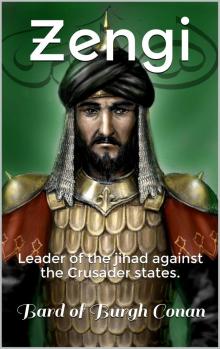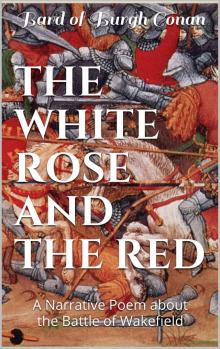- Home
- Bard of Burgh Conan
The White Rose and the Red Page 4
The White Rose and the Red Read online
Page 4
There is much discussion among historians about the reasons for York's sally (see Dockray and Knowles who give a full acount of the different points of view). On the face of it, it seems a rash move, but given that he was short of provisions, and that the bulk of the Lancastrian army was under cover, it appears that he was unware of the greatly superior size of the army he was taking on.
The story of the cold-blooded murder of Edmund and the mocking of York are both taken from Hall, who loved a good story. However, according to Dockray and Knowles, it is most likely that they were killed in the fight or in the flight from battle.
The symbols of the red and white rose were not as developed at the time as they were in later accounts, nor does it seem from contemporary illustrations that men-at-arms wore jupons in this period. They seem to have worn painted armour – or 'harness', as they called it – with few distinguishing marks. My depictions of White Rose and Red Rose jupons, and Queen Margaret handing out red roses to her knights are just story-teller's elaborations. If you prefer a historically accurate account you could do no better than to read Dockray and Knowles' essay.
ABOUT THE AUTHOR
Bard of Burgh Conan is one of the pen names of Christopher Webster. He was brought up in Conisbrough, went to Station Road School, and has lived at various times on Daylands Avenue, Roberts Avenue and Castle Avenue. The town, with its rich history and magnificent castle, has been an important influence in his life and has inspired some of his best work, hence his pen-name, Bard of Burgh Conan (from a medieval form of the town’s name). He read English at St David’s, Lampeter and Leeds University, and is now a teacher and writer. His first educational publication was Poetry Through Humour and Horror (Cassell, 1987). This was followed by many more educational publications including books for KS3 and GCSE English Language and Literature published by Hodder, and the best-selling 100 Literacy Hours (Scholastic, 1997/2005). He has also published several novels and some volumes of poetry under his own name. His writing about Conisbrough includes Crusader, The Abduction of Lady Alice, Richard of Conisbrough, The Poet and the Castle, Conisbrough Tales, Coal Dust Kisses and three books of short stories.

 Zengi
Zengi The White Rose and the Red
The White Rose and the Red